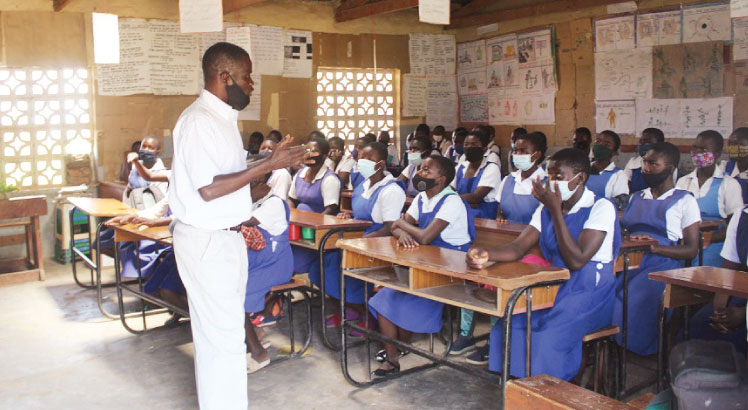LDF defends maintaining Cashgate suspect
While government has interdicted most employees answering Cashgate-related cases in court, the Local Development Fund (LDF) has maintained in full-time employment a procurement specialist who is answering theft and money laundering charges.
The Anti-Corruption Bureau (ACB) and the Department of Human Resources and Manpower Development (DHRMD) have described Yvonne Kaphantengo’s continued working, three years after she was charged in 2013, as irregular.
But the LDF has said whatever Kaphantengo is accused of did not directly harm the agency; hence, its decision not to suspend her.
Kaphantengo herself said in an interview on Friday that her employers are aware of her legal issues.
The LDF—a local development financing arm of the Ministry of Finance, Economic Planning and Development—has an average annual budget of around K20 billion funded under Vote 272 of the National Budget.
Its sources of funding are the government of Malawi and development partners such as the World Bank as well as the African Development Bank (AfDB).
Of the K20 billion annual budget, 90 percent (around K18 billion) goes to councils through the National Local Government Finance Committee (NLGFC) to finance various projects at community and local authority levels.
The remaining 10 percent (roughly K2 billion) remains at the LDF secretariat called the Technical Support Team (TST).
Out of the TST budget, 70 percent (around K1.4 billion) goes into procurement whose manager is Kaphantengo.
Kaphantengo—charged together with her husband Cornelius as directors of Nova Technology and 14 others—is answering charges of conspiracy to commit a felony, theft and money laundering in connection with the 2011 theft where K201 million was alleged to have been stolen.
ACB deputy director Reyneck Matemba confirmed in an interview last week that Kaphantengo was one of the 14 people accused of being involved in a Cashgate case and that the matter was still in court.
“What I know is that all government employees that were implicated in Cashgate are on interdiction. I am not sure why she is not, but maybe it is something to do with conditions of service where she works,” said Matemba.
He further said ACB normally writes DHRMD if the suspect is a civil servant, informing them why they have arrested the person, the proposed charges and the status of the case, and whether the person has been released on bail or not.
“I don’t know their [LDF] conditions of service. As a bureau, once we arrest a civil servant, we inform the employer. It is up to them to follow procedures as in Malawi Public Service Regulations (MPSR) and other laws and then they are expected to take appropriate action,” he said.
Matemba said DHRMD was in a better position to explain why Kaphantengo was not on interdiction.
In a separate interview, DHRMD spokesperson Rudo Kayira said normally, the LDF should have written DHRMD informing them of Kaphantengo’s case and outlining the action they will take.
Kayira said DHRMD hired Kaphantengo on behalf of LDF and that it was expected that the fund would inform the department of her involvement in Cashgate-related cases and make recommendations to the department.
Kayira said: “In this case, what should happen is, if her employer feels that the charges levelled against her are such that the employer needs to take disciplinary action, the employer will make a recommendation to this department as facilitator of the contract and this department will look at the conditions of her contract and take or recommend appropriate action to the employer”.
But LDF executive director Charles Mandala said his organisation did not take action against Kaphantengo because they believed what happened has no direct bearing on the fund.
“To us, we do not have any complaint. We have to look at our regulations and she has not offended us directly in our office, it is something to do with her husband’s company and her brother. So, it is not herself directly. ACB, if anything, if they had issued a complaint direct to us relating to her services, we could have taken action,” said Mandala.
Public servants, according to section 22 (c) of MPSR, are not supposed to become a director or engage directly or indirectly in the management or direction of any company or syndicate.
In a telephone interview on Friday, Kaphantengo said her employers were aware that she was answering a case in court.
She, however, said she was not a civil servant as she was working at LDF as a consultant.
Kaphantengo and 14 others are accused of stealing government money between November 2010 and June 2011 from the Ministry of Disability and Elderly through the Accountant General’s office.
She, however, pleaded not guilty to three counts each of conspiracy to commit a felony, theft and money laundering.
The other co-accused are Chikondi Chimutu, whose theft charge involves K18.3 million, Deusdedit Tenthani (K16.2 million), Tendai Nayeja (K27.1 million), Audney Kamitengeni (K9.9 million), Conrad Nambala (K38.4 million), Squire Chakwana (K10.7 million), Jimmy Mbuliro (K3 million), Wides Machika (K5 million), Tapiwa Ng’oma (K9.1 million), Khumbo Banda (K2.7 million) and Justina Nyirenda who was charged with abuse of public office as she was an accounts assistant in the AG’s office. n





